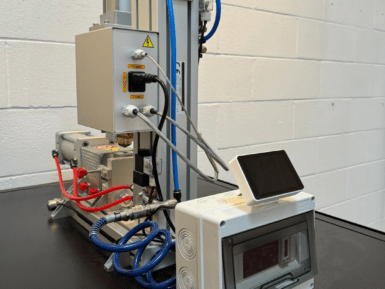
Overview
The DFRobot Solar Power Manager series are designed for IoT projects and renewable energy projects, providing safe and high-efficiency embedded solar power management modules for makers and application engineers.
This medium-power high-efficiency solar power management module allows you to charge a 12V lead-acid battery with a maximum of 4A using a standard 18V solar panel.
Solar Power Manager For 12V Lead-Acid Battery is a medium-power high-efficiency solar power management module, which is able to charge a 12V lead-acid battery with a maximum of 4A using a standard 18V solar panel. It is suitable for applications within 100W, such as 12V lighting equipment, security monitoring, small robots, pumps or environmental monitoring stations.
It features as MPPT(Maximum Power Point Tracking) function, maximizing the output power of solar panels under various sunlight. Compared with common PWM solar controllers, it can improve charging performance by 10%-30%. Benefited from its small size and light weight, it is easier to embed it in your projects.
The module provides dual high-power outputs 5V 5A (OUT1) and 12V 8A (OUT2) and dual USB outputs 5V 2.5A (USB1/USB2). Except USB1, all outputs can be turned ON/OFF by I/O pins of most controllers (3.3V/5V compatible).
This feature helps to dynamically power loads and reduce power consumption. Various protection functions are also employed to ensure the safety and stability of the solar systems.
Get Inspired

… and equipment status from anywhere with an Internet connection. Additionally, the Arduino Opta WiFi is equipped with RS485 communication capabilities, enabling seamless integration with an external power meter – in our case, a Finder model. This provides valuable insights into energy consumption, production output, material usage, and equipment health. The collected data is then analyzed through dedicated dashboards, offering information about operational efficiency and potential issues. By leveraging this data, businesses can proactively schedule maintenance and repairs, minimizing downtime and optimizing production processes. Retrofitting for a connected future Many businesses today can retrofit existing machinery to embrace the benefits of connectivity and automation. Our demo provides a practical example of how common industrial equipment can become smarter, more efficient, and easier to manage. From remote monitoring and control to power metering and predictive maintenance, retrofitting offers a sustainable way to modernize industrial infrastructure. Unlocking potential across industries Moreover, the versatility of Arduino’s open-source ecosystem ensures that this solution can be adapted and applied to a wide range of existing machines and equipment, enhancing their operation effectively – whether in manufacturing, logistics, or any other industry relying on machinery. To learn more about how you can leverage Arduino technology to upgrade your infrastructure and achieve tangible results, contact us today. Let us help you unlock the full potential of your industrial assets with practical, cost-effective solutions.







